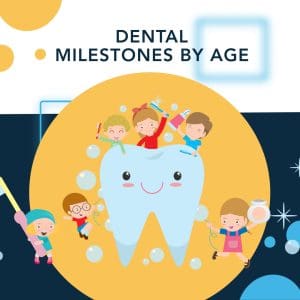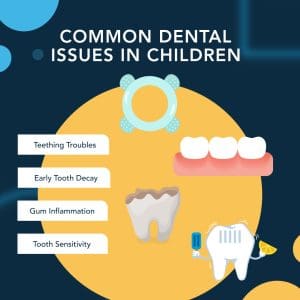Knowing when to schedule your child’s first dental visit is an essential step in ensuring their lifelong oral health. Early dental care not only helps prevent signs of tooth decay and other issues but also sets the foundation for positive habits and experiences. This guide will walk you through the recommended timelines for dental checkups, age-specific milestones, and how to make dental appointments stress-free. With the right start, your child’s smile can stay healthy and bright for years to come.
Why Early Dental Visits Are Important
Early dental visits play a vital role in your child’s overall health and development. They help identify and prevent issues like tooth decay, gum disease, and alignment problems before they worsen. These visits also create positive experiences, fostering trust with the dentist and reducing fear. By starting dental care early, your child develops healthy oral hygiene habits that can last a lifetime, ensuring strong teeth, a confident smile, and better overall well-being.
Why Pediatric Dentists Are the Best Choice
Pediatric dentists specialize in caring for children’s unique dental needs, making them the ideal choice for your child’s oral health. They’re trained to handle growing teeth, gums, and jaws while creating a kid-friendly environment that eases anxiety. With gentle techniques and age-appropriate communication, they make dental visits positive and stress-free. Pediatric dentists also provide guidance tailored to parents, helping you navigate your child’s dental milestones and build lifelong healthy habits for a confident, happy smile.
The First Dental Visit
The first dental visit is an important milestone in your child’s oral health journey. It’s an opportunity to introduce them to the dental environment, establish trust with the dentist, and address any early dental concerns. This visit sets the foundation for healthy habits and positive associations with dental care. By starting early, you’re giving your child the best chance for a lifetime of strong teeth, healthy gums, and confident smiles. A good experience now ensures easier visits later.
Timing Your First Appointment
The American Dental Association recommends the ideal time for your child’s first dental visit is within six months of their first tooth erupting or by their first birthday. Early visits help monitor tooth development, address potential issues, and establish a dental care routine.
Preparing Your Baby
Preparing your baby for their first dental visit can make the experience smoother. Use gentle language to introduce the idea, and try role-playing by gently examining their mouth. Keeping the preparation light and positive helps create familiarity and comfort, ensuring your baby feels more at ease during the appointment.
Creating a Calm Environment
A calm, reassuring environment can make a big difference for your baby’s first dental visit. Bring a favorite toy or blanket to offer comfort, and maintain a cheerful demeanor yourself. A relaxed atmosphere helps your baby feel secure, turning the experience into a positive step in their oral health journey.
Building Trust with the Dentist
Building trust between your child and their dentist starts with a warm, friendly introduction. Pediatric dentists are skilled at engaging kids with age-appropriate language and gentle approaches. Allowing your child to observe and interact naturally with the dentist fosters familiarity and helps establish a positive, long-term relationship for future visits.
Questions to Ask
During the first visit, ask the dentist about your child’s oral health, teething progress, and proper care techniques. Inquire about fluoride use, brushing routines, and dietary recommendations. Open communication ensures you feel confident in managing your child’s dental health and helps you address any concerns early in their development.
Dental Milestones by Age
Children’s dental needs evolve as they grow, with specific milestones marking each stage of their oral development. From the appearance of their first tooth to the transition to permanent teeth, understanding these milestones helps ensure timely dental care and preventative measures. Regular checkups at each stage support healthy growth, proper alignment, and the prevention of issues like cavities or misaligned teeth. Being aware of these milestones empowers parents to guide their children toward lifelong oral health.
Ages 1-2: First Visit and Regular Checkups
Between ages 1 and 2, children should have their first dental visit and establish a schedule for regular checkups, ideally every six months. These visits focus on monitoring baby teeth as they emerge, assessing gum health, and introducing proper oral care routines. Early dental visits set the foundation for a lifetime of healthy habits.
Ages 3-5: Monitoring Baby Teeth and Teaching Brushing
At this stage, the focus shifts to monitoring the development of baby teeth and teaching proper brushing techniques. Parents should guide their children in using a soft toothbrush and fluoride toothpaste. Regular checkups help ensure baby teeth stay healthy, paving the way for a smooth transition to permanent teeth in the years ahead.
Ages 6-8: Preparing for Permanent Teeth
By ages 6 to 8, children begin losing baby teeth and gaining permanent ones. This stage emphasizes preventing cavities and ensuring new teeth emerge properly. Dentists may recommend sealants for added protection and assess the alignment of growing teeth. Reinforcing good oral hygiene habits during this time is critical for long-term dental health.
Ages 9-12: Addressing Orthodontic Concerns
From ages 9 to 12, dentists monitor the development of permanent teeth and identify potential orthodontic issues like crowding or bite misalignment. Early intervention, such as braces or other treatments, can help guide proper alignment. This stage also focuses on maintaining oral hygiene as children grow more independent in their dental care routines.
Common Dental Issues in Children
Children can experience a variety of dental issues as they grow, ranging from minor concerns to more serious problems. These may include challenges with tooth decay, gum health, or alignment as their teeth develop. Recognizing and addressing these issues early helps prevent complications and supports long-term oral health.
Teething Troubles
Teething can cause discomfort as your child’s first teeth emerge, leading to irritability, drooling, and gum swelling. While this is a natural process, soothing techniques like gentle gum massages or teething toys can help ease discomfort. Regular checkups ensure the teeth erupt properly and that your child’s oral health stays on track.
 Early Tooth Decay
Early Tooth Decay
Early tooth decay, often caused by prolonged exposure to sugary drinks or poor oral hygiene, can harm baby teeth. Cavities may develop, leading to pain or further dental issues. Teaching proper brushing habits and ensuring a balanced diet helps prevent decay, while regular dental visits allow early detection and treatment.
Gum Inflammation
Gum inflammation in children, often due to plaque buildup, can cause redness, swelling, or bleeding gums. If left untreated, this condition may lead to early gum disease. Encouraging consistent brushing and flossing, along with professional cleanings, can help maintain healthy gums and prevent more serious oral health concerns.
Tooth Grinding
Tooth grinding, or bruxism, is common in children and often occurs during sleep. It may cause enamel wear, jaw discomfort, or headaches. While it’s often temporary and linked to stress or alignment issues, a dentist can recommend strategies, like a custom mouthguard, to protect your child’s teeth and address underlying causes.
Misaligned Teeth
Misaligned teeth can result from genetics, thumb-sucking, or early tooth loss. Crowding, gaps, or bite issues may affect chewing and speech development. Regular dental visits can identify alignment concerns early, allowing for timely intervention like braces or other orthodontic treatments to guide proper alignment and promote a healthy, confident smile.
Tooth Sensitivity
Tooth sensitivity in children may occur due to enamel erosion, cavities, or gum recession. It can make eating and drinking uncomfortable, especially with hot or cold items. A Plantation dentist can pinpoint the cause and recommend treatments, like fluoride applications or sensitivity toothpaste, to protect your child’s teeth and alleviate discomfort.
Mouth Injuries
Active children are prone to mouth injuries from sports, falls, or accidents, which can result in chipped, cracked, or displaced teeth. Quick action, such as visiting a dentist promptly, can help address the injury and prevent complications. Using protective gear like mouthguards during sports can also minimize the risk of dental trauma.
Stubborn Baby Teeth
Stubborn baby teeth that don’t fall out on time can delay the eruption of permanent teeth, leading to crowding or alignment issues. Regular dental checkups ensure that these teeth are monitored, and intervention, such as extraction, can be recommended if necessary. Addressing stubborn baby teeth early supports proper oral development.
How to Maintain Oral Health Between Visits
Maintaining good oral health between dental visits is essential for preventing issues like cavities and gum disease. Consistent at-home care, healthy dietary choices, and fostering good habits play a key role in keeping your child’s teeth and gums healthy. By prioritizing daily oral hygiene and monitoring their progress, you can ensure they stay on track with their dental care. These efforts not only support their current oral health but also set the foundation for lifelong habits.
Teaching Proper Brushing Techniques
Teaching your child proper brushing techniques helps ensure thorough cleaning and protects their teeth from decay. Show them how to use a pea-sized amount of toothpaste and angle the brush to clean all surfaces. Supervise their brushing until they develop the skill and consistency to maintain effective oral hygiene independently.
The Importance of Flossing Early
Flossing removes plaque and food particles between teeth where brushing can’t reach, preventing cavities and gum issues. Introducing flossing early helps your child develop this vital habit as part of their routine. Flossing aids in maintaining strong, healthy teeth and promotes good gum health as their smile continues to develop.
Choosing Tooth-Friendly Snacks
Nutritious snacks like fruits, vegetables, and cheese support your child’s oral health by strengthening enamel and reducing sugar exposure. Avoid sticky or sugary treats that can lead to decay. Encouraging tooth-friendly snacks helps balance their diet and contributes to healthier teeth, making snack time an opportunity for improved oral care.
Monitoring Your Child’s Oral Hygiene Routine
Regularly monitoring your child’s oral hygiene routine ensures they brush and floss effectively and consistently. Check their technique and provide positive reinforcement to keep them motivated. Being involved in their daily habits not only prevents dental issues but also reinforces the importance of maintaining a healthy, bright smile.
Schedule a Checkup with a Dentist in Plantation, FL
Regular dental checkups are essential for maintaining your child’s oral health, and finding the right Plantation dentist can make all the difference. Scheduling a visit with a skilled dentist near me ensures your child receives expert care in a welcoming environment. A trusted dentist in Plantation, Florida, can help monitor your child’s dental milestones, prevent potential issues, and reinforce positive oral hygiene habits. Start their journey toward lifelong healthy smiles by booking an appointment today!
February 21, 2025

 Adult
Adult




 Early Tooth Decay
Early Tooth Decay